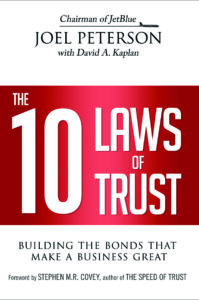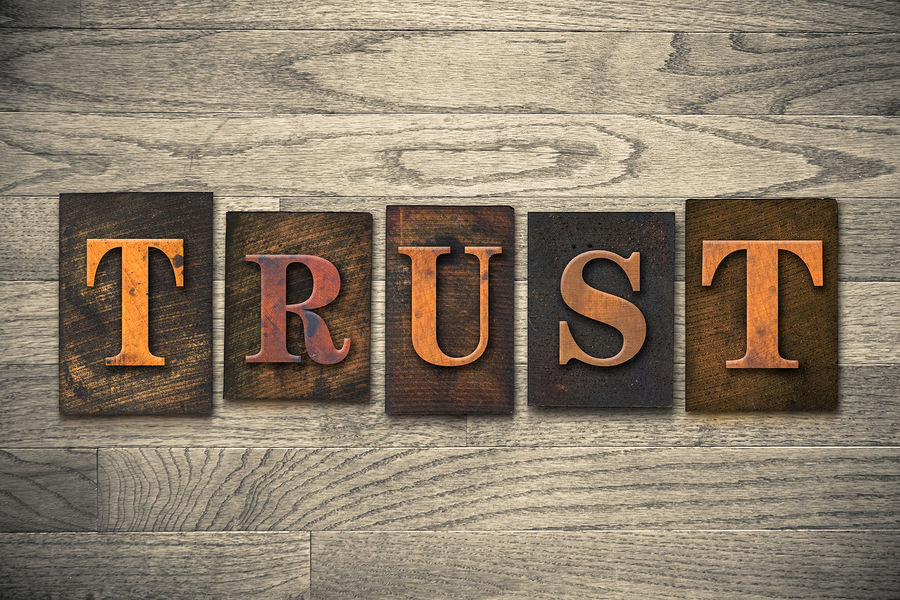Building the Bonds that Make a Business Great
Trust is vitally important to creating sustainable results.
If you’re a leader, you know how important it is to create and maintain a culture of trust. But knowing it and doing it are different. How do leaders at all levels of an organization make this a reality?
JetBlue Chairman Joel Peterson’s career has provided him a window into the importance of trust. In addition to his role at JetBlue, Joel is a consulting professor at the Stanford Graduate School of Business and chairman of an investment firm. His new book,The 10 Laws of Trust: Building the Bonds that Make a Business Great, is an exceptionally great read.
I recently had the opportunity to talk with Joel about all things “trust.”
Increase Your Trust
What’s the Joel Peterson definition of trust?
Empowering and turning over control to another person. It takes the same leap of faith as when we trust a pilot to fly a plane or a surgeon to operate on us. We give trust in increments, measure results, assess risks and grant more trust until we find we’ve extended our reach, expanded our horizons and found greater joy in our interactions with others.
You’ve seen the inside of many organizations and leadership teams from your vantage point as Chairman, as professor, as an investor, as a CFO, etc. When you first walk into an organization, what signs do you see that would lead you to say, “This is an organization with a high degree of trust?”
Surprisingly, high trust organizations are ones with conflict – with respectful disagreements that are ventilated, addressed and put to bed so they don’t fester underground. The best ideas win, not the most powerful or senior people. And they’re typically places where there’s humor, self-deprecation, stories, traditions and people who genuinely like each other.
Cultivate a Culture of Trust
What’s a leader’s role in cultivating a culture of trust? How have you seen this go wrong?
The leader’s role is vital. An EVP at Cisco once told me that she found she couldn’t be happier than her unhappiest child. In like manner, an organization’s boundary of trust is set by its leader. It’ll never expand beyond the leader’s trustworthiness. If he or she has a big “say-do gap,” the contagion will spread. If leaders compartmentalize their lives and file violations of trust under the “private label,” they’ll be mistrusted. People are smart. They’ll figure it out, and it’s not long before their wariness infects everyone and everything. As fear takes over, people become less likely to innovate, to take risks, to trust. This can either explode in trust-destroying outcomes such as the recent VW scandal or end up in bureaucratic inaction, caution and failure to perform such as at the Veterans’ Administration.
How is respect linked to trust? How do you show respect?
Respect is the medium of exchange between parties that are building trust. A failure to show respect is a trust show-stopper – even if you’re not the person who is being treated disrespectfully. This extends from teammates to suppliers to lenders to shareholders to customer. Nothing shows greater respect for another than listening to them. It’s at the heart of customer service and team-building. I think of it as listening without agenda, listening to understand, not to respond, to agree or disagree, not until there’s a break so I can respond.
Let’s talk about great communication. It’s vitally important to creating trust, but it’s a constant challenge for leaders. How do leaders strike the right balance between “telling it like it is” and being positive? What advice do you give to the leader who wants to communicate to increase trust?
Leaders develop a brand over time – the best ones for telling bad news as well as good news, for communicating before, during and after events, communicating in the moment. If this brand of transparency and authenticity is built up in good times and bad, leaders keep the trust of teammates. “Spin” is not as kind as giving immediate feedback with specificity and mutual commitment. People often fear directness, preferring to “sugar-coat” bad news or negative feedback. It’s far better to respectfully tell it like it is than to hide the truth only to have it emerge later in a form that’s harder to address. “May I give you some feedback?” “While things are not going well now, the following path to improvement is a good one:” “We’ll all need to ‘up our game’ if we’re to succeed. Here are the first steps I see. What ones do you see?” All show respect. All demand change.
The 10 Laws of Trust
1: Start with personal integrity
2: Invest in respect
3: Empower others
4: Measure what you want to achieve
5: Create a common dream
6: Keep everyone informed
7: Embrace respectful conflict
8: Show humility
9: Strive for win-win negotiations
10: Proceed with care
Empower Others to Increase Trust
Empowerment is one of your major discussion points. You share a memorable story of your first time driving. How does empowerment increase trust? What do leaders get wrong in empowerment efforts?
Empowerment is the indicia of trust. Trust is not just a feel-good emotion. It starts when others rely on you to deliver results. And it increases when you do. In business, it’s often those closest to the action who must be trusted to deliver. This means empowering them to made decisions. They won’t always get it right; so recovery is important. This means supporting them, learning from mistakes, fixing imperfect outcomes and trusting again. Back to the story of my driving failure, I’ve often thought back on my father tossing me the keys and saying simply, “Don’t forget to put it in drive this time.” That’s all most people need to deliver the next time. Punishing failure means less initiative, fewer innovations, warier people and more political behavior until the best ideas no longer win.
Does building trust differ when working with those from different backgrounds? How do you build trust across generations, country borders, language, ethnic, or cultural barriers? Are there any unique considerations?
I think people respond to respect, to being listened to, to showing an interest in them and what matters to them. People respond to genuine caring – across generations, borders, language and cultural differences. Of course there are differences, and they need to be understood to be respected as a starting point. And, of course, there are some who use these differences to divide us, to pigeon-hole members of a sub-group. My own experience is that individual variability is far greater than group variability and that it’s offensive to people to be labeled. Treating people as unique individuals is an expression of respect from which you can build trust – no matter the differences in age, gender, political leanings, or language.
How to Regain Lost Trust
 Is it possible to regain trust once it’s lost?
Is it possible to regain trust once it’s lost?
It is possible. And it is very difficult. Trust is “one-way sticky.” It’s built up a conversation and an action at a time, and it can be destroyed in a single act – often never to be recovered. And it is often better just to spend time and energy building new trust relationships. Occasionally, the stakes are high, and it’s worth the herculean effort to rebuild from a betrayal. But there are rules for this that include a recognition of the betrayal, an honest apology and a commitment moving forward.
In any event, even when the “view is just not worth the climb,” it’s always best to move on, to focus on the future, to let go of anger or any desire for retribution. Betrayal stings. The only thing worse is to wallow in it.
Early in your career, your company’s founder called you into the office on a Sunday. You refused because of your unwavering commitment to your family time. I love your stand. Tell us more about it and how it relates to trust.
I would say that I “declined the opportunity.” I believe that setting boundaries in one’s life allows others to trust you. They know where you stand, what matters most to you. They can work with your “givens.” Not everything is a case of first impression, subject to the vagaries of circumstances, mood, or time. In other words, by understanding your map, your boundaries, they can trust you. This doesn’t mean inflexibility, merely prioritization, a necessary decision about what are your values. Where will you devote your time, money and mental energy? These are your values, and if others know them, too, they can trust you.
The 10 Laws of Trust: Building the Bonds that Make a Business Great

